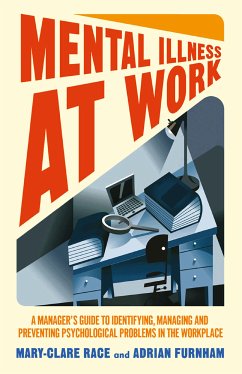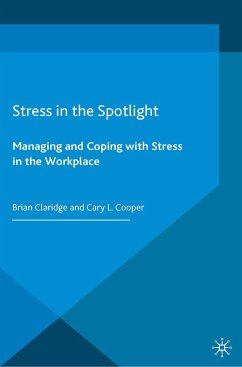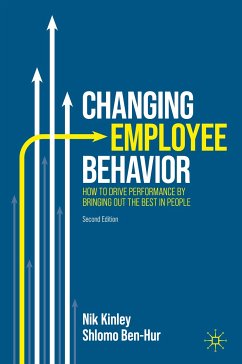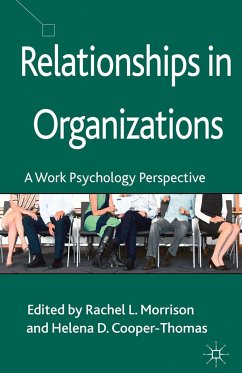
Mental Illness at Work (eBook, PDF)
A manager's guide to identifying, managing and preventing psychological problems in the workplace

PAYBACK Punkte
24 °P sammeln!






It is argued that the incidence of mental illness in the workplace is more common than many realize, ranging from stress to schizophrenia. In this book leading psychologists Adrian Furnham and Mary-Clare Race explore the psychiatric classification of illness and how symptoms can be identified to help develop mental health literate organizations.
Dieser Download kann aus rechtlichen Gründen nur mit Rechnungsadresse in A, B, BG, CY, CZ, D, DK, EW, E, FIN, F, GR, HR, H, IRL, I, LT, L, LR, M, NL, PL, P, R, S, SLO, SK ausgeliefert werden.
Mary-Clare Race is Associate Director at ARUP where she leads a team who consult on enhancing human behaviour in the workplace. She is an Organizational Psychologist with significant experience gained internationally in a range of public and private sector companies and specializes in the area of Leadership Development and Change Management. Clients include the NHS, Heathrow Airport, Network Rail and Siemens. Mary-Clare is in the final stages of a PhD at University College London on the topic of dysfunctional leadership behaviour. She is a member of the British Psychological Society Division of Occupational Psychology and The Association of Business Psychologists and was a keynote speaker at the Airport Leadership and Change Management Forum in 2012. Adrian Furnham is Professor of Psychology at University College, London, UK, and Adjunct Professor at the Norwegian School of Management. He is the author of over 800 journal articles and more than 60 books, including several successful management books and has been recognized as one of the most productive psychologists in the world. He is a leading expert on the application of psychology to leadership, management and work and employment related areas including recruitment, team building, etc. He acts as a consultant to a number of multinational corporations and organizations and is a frequent speaker at conferences and events. He has written regular columns for the Sunday Times, Financial TimesDaily Telegraph and frequently speaks on television and radio. He is a very well-known and respected writer and recently was awarded the Academic Contribution to Practice Award of the British Psychological Society.
Produktdetails
- Verlag: Palgrave Macmillan UK
- Seitenzahl: 246
- Erscheinungstermin: 29. Juni 2014
- Englisch
- ISBN-13: 9781137272058
- Artikelnr.: 41499333
'fascinating facts abound, but more importantly, this book is informative, supportive and nurturing for professionals who might be lost when confronted by a troubled colleague' - People Management
"A timely contribution to the widely recognised problem of psychological pressures in the work setting and its impact on psychological (ill) health. This book is likely to be beneficial for managers, counsellors and health professionals, in identifying potential work-related stressors and providing invaluable information pertaining to interventions for prevention and effective treatment of such problems." - Bruce Kirkcaldy, Director, International Center for the Study of Occupational and Mental Health, Düsseldorf; Affiliate Professor,
"A timely contribution to the widely recognised problem of psychological pressures in the work setting and its impact on psychological (ill) health. This book is likely to be beneficial for managers, counsellors and health professionals, in identifying potential work-related stressors and providing invaluable information pertaining to interventions for prevention and effective treatment of such problems." - Bruce Kirkcaldy, Director, International Center for the Study of Occupational and Mental Health, Düsseldorf; Affiliate Professor,
Mehr anzeigen
Centre for Resilience and Socioemotional Health, University of Malta
'The imperative of integrated healthcare (i.e. the integrated treatment of mental and physical illness) is increasingly becoming the gold standard of world-class healthcare provision. Acknowledging the pervasiveness, range and scope of mental illness within physical medicine environments is difficult enough; how much more so is it the case within organisational settings. Race and Furnham have made a landmark contribution not only to the de-mystification of mental illness, but also towards our ability to recognise, understand, discuss and deal constructively with mental health issues at work. This book has the potential to become a 'game changer' in the way inwhich mental illness at work is viewed and managed. It will be warmly welcomed by occupational psychologists as well as those in organisations concerned with the well-being, performance, health and satisfaction of people at work.'
-Neville Osrin, Busines Psychologist and Consultant; Fellow, University of Exeter
'This is a very timely, authoritative and informative book - it takes the lid off the taboo of mental illness at work. The book is for all those who want to contribute to creating a mentally healthy workplace using the latest evidence and guided by leading experts in the field".
-Malcolm MacLachlan, Professor of Global Health, Centre for Global Health & School of Psychology,Trinity College Dublin, Ireland.
'The book Mental Illness at Work represents a milestone. As the one of the first books of its kind it provides indispensable knowledge on mental illness, how to discover, and how to deal with various forms of such illnesses in the work place. As such, the book provides research based, but easily accessible information on a topic that is commonly not discussed in organisations. The message is clear: when properly dealt with, mental illness will not necessarily be detrimental to productivity, everyday functioning, and eventually happiness. Since mental illness can be found in all organisations, and affects a large number of people, the book is important for managers, HR staff, consultants, and even those suffering from various conditions and their colleagues.'
-Øyvind Martinsen, Professor, Department of Leadership and Organizational Behaviour, BI: Norwegian Business School
'If work is driving you mad or someone at work is then this book could just save you and your career - an erudite but easy guide for managers and the managed.'
-Raj Persaud, Gresham emeritus visiting professor for public understanding of psychiatry
'Mental Illness at Work superbly highlights one of the major costs of sickness absence and poor productivity at work, the common mental disorders of depression, anxiety and stress. The authors also highlight workaholism, alcoholism and drugs as well. An important book on a critical business issue.'
-Cary L. Cooper, CBE, Distinguished Professor of Organizational Psychology and Health at Lancaster University and Chair of the Academy of Social Sciences
'At last - a book that takes the intersection between work and mental health seriously! Whether it is managing global talent and boosting cultural competency, or dealing with work and workplace addiction, or thwarting the office psychopath - this book has something useful - insightful - for everyone. Penned by leading scholars with a knack for making evidence-based psychology accessible, digestible, actionable, the book breaks new ground. It changes how we think about work in the 21st century. It will make a difference to people's working and wider lives. It accentuates the positive byeliminating the negative.'
-Prof. Stuart C. Carr, School of Psychology, Massey University, New Zealand
'I have been seeking a book like this for over ten years. The importance of mental health at work, with its astonishing financial costs to business, industry and the country, together with what can be disastrous consequences to employees, has meant that there has to be new understanding of the responsibilities of organisations to their staff, and the need for managers to be able to identify the symptoms, causes, and effects of mental ill-health at work. Race and Furnham's writing style is easily accessible and they covers a very broad range of topics within this important subject. I am grateful to them for developing this comprehensive guide to the key topics that make essential reading for anyone interested in improving the world of work.'
-Gilly Wiscarson, Course Leader, MSc Organisational psychiatry and Psychology,
Institute of Psychiatry, King's College, London
'The imperative of integrated healthcare (i.e. the integrated treatment of mental and physical illness) is increasingly becoming the gold standard of world-class healthcare provision. Acknowledging the pervasiveness, range and scope of mental illness within physical medicine environments is difficult enough; how much more so is it the case within organisational settings. Race and Furnham have made a landmark contribution not only to the de-mystification of mental illness, but also towards our ability to recognise, understand, discuss and deal constructively with mental health issues at work. This book has the potential to become a 'game changer' in the way inwhich mental illness at work is viewed and managed. It will be warmly welcomed by occupational psychologists as well as those in organisations concerned with the well-being, performance, health and satisfaction of people at work.'
-Neville Osrin, Busines Psychologist and Consultant; Fellow, University of Exeter
'This is a very timely, authoritative and informative book - it takes the lid off the taboo of mental illness at work. The book is for all those who want to contribute to creating a mentally healthy workplace using the latest evidence and guided by leading experts in the field".
-Malcolm MacLachlan, Professor of Global Health, Centre for Global Health & School of Psychology,Trinity College Dublin, Ireland.
'The book Mental Illness at Work represents a milestone. As the one of the first books of its kind it provides indispensable knowledge on mental illness, how to discover, and how to deal with various forms of such illnesses in the work place. As such, the book provides research based, but easily accessible information on a topic that is commonly not discussed in organisations. The message is clear: when properly dealt with, mental illness will not necessarily be detrimental to productivity, everyday functioning, and eventually happiness. Since mental illness can be found in all organisations, and affects a large number of people, the book is important for managers, HR staff, consultants, and even those suffering from various conditions and their colleagues.'
-Øyvind Martinsen, Professor, Department of Leadership and Organizational Behaviour, BI: Norwegian Business School
'If work is driving you mad or someone at work is then this book could just save you and your career - an erudite but easy guide for managers and the managed.'
-Raj Persaud, Gresham emeritus visiting professor for public understanding of psychiatry
'Mental Illness at Work superbly highlights one of the major costs of sickness absence and poor productivity at work, the common mental disorders of depression, anxiety and stress. The authors also highlight workaholism, alcoholism and drugs as well. An important book on a critical business issue.'
-Cary L. Cooper, CBE, Distinguished Professor of Organizational Psychology and Health at Lancaster University and Chair of the Academy of Social Sciences
'At last - a book that takes the intersection between work and mental health seriously! Whether it is managing global talent and boosting cultural competency, or dealing with work and workplace addiction, or thwarting the office psychopath - this book has something useful - insightful - for everyone. Penned by leading scholars with a knack for making evidence-based psychology accessible, digestible, actionable, the book breaks new ground. It changes how we think about work in the 21st century. It will make a difference to people's working and wider lives. It accentuates the positive byeliminating the negative.'
-Prof. Stuart C. Carr, School of Psychology, Massey University, New Zealand
'I have been seeking a book like this for over ten years. The importance of mental health at work, with its astonishing financial costs to business, industry and the country, together with what can be disastrous consequences to employees, has meant that there has to be new understanding of the responsibilities of organisations to their staff, and the need for managers to be able to identify the symptoms, causes, and effects of mental ill-health at work. Race and Furnham's writing style is easily accessible and they covers a very broad range of topics within this important subject. I am grateful to them for developing this comprehensive guide to the key topics that make essential reading for anyone interested in improving the world of work.'
-Gilly Wiscarson, Course Leader, MSc Organisational psychiatry and Psychology,
Institute of Psychiatry, King's College, London
Schließen
Für dieses Produkt wurde noch keine Bewertung abgegeben. Wir würden uns sehr freuen, wenn du die erste Bewertung schreibst!
Eine Bewertung schreiben
Eine Bewertung schreiben
Andere Kunden interessierten sich für











